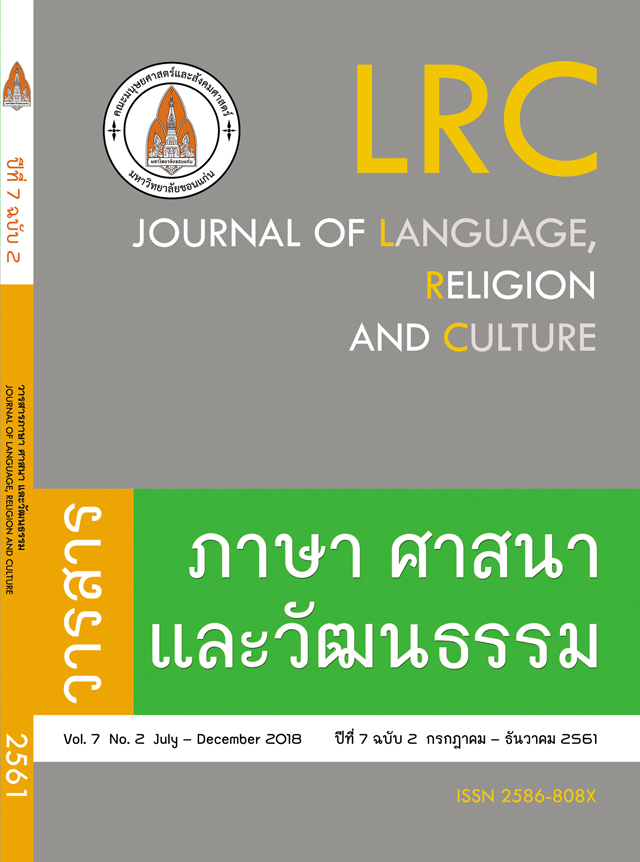ผลกระทบของการเขียนข้อแนะนำเพื่อแก้ไขโดยตรงอย่างมีวิจารณญาณเกี่ยวกับความถูกต้องตามหลักไวยากรณ์ของนักเรียนที่เรียนภาษาอังกฤษเป็นภาษาต่างประเทศ ; The Effect of Direct Focused Metalinguistic Written Corrective Feedback on the EFL Students’ Grammatical Accuracy
Keywords:
Direct focused metalinguistic, Grammatical accuracy, L2 writing class, L2 writing, Corrective feedback, การแก้ไขโดยตรงอย่างมีวิจารณญาณ, ความแม่นยำของหลักไวยากรณ์, วิชาการเขียนของนักศึกษาที่เรียนภาษาอังกฤษเป็นภาษาที่สอง, การเขียนของนักศึกษาที่เรียนภาษาอังกฤษเป็นภาษาที่สองการให้ข้อแนะนำเพื่อความถูกต้องAbstract
งานวิจัยนี้มีจุดประสงค์เพื่อศึกษาผลของการเขียนข้อแนะนำเพื่อแก้ไขโดยตรงอย่างมีวิจารณญาณเกี่ยวกับความถูกต้องของหลักไวยากรณ์ของนักศึกษาชาวอินโดนีเซียที่เรียนภาษาอังกฤษเป็นภาษาต่างประเทศ ผู้วิจัยส่งเสริมความการเขียนที่ถูกต้องให้แก่นักเรียนด้วยการผสมผสานกันของการเขียนข้อแนะนำและการเน้นย้ำเพื่อแก้ไขโดยตรงอย่างมีวิจารณญาณ งานวิจัยนี้ใช้กลุ่มทดลองหนึ่งกลุ่ม โดยกลุ่มทดลองจะได้รับการทดสอบก่อนเรียนและแบบทดสอบหลังเรียนทันที และจะได้รับแบบทดสอบหลังเรียนอีกครั้งหลังจากทิ้งช่วงการเรียน กลุ่มทดลองของงานวิจัยนี้ประกอบไปด้วยนักศึกษาชั้นปีที่ 1 สาขาการสอนภาษาอังกฤษ คณะสังคมศาสตร์และรัฐศาสตร์ มหาวิทยาลัย West Sulawesi ประเทศอินโดนีเซีย เพียงชั้นเดียวเป็นจำนวน 43 คน ซึ่งผู้เข้าร่วมทั้งหมดได้เข้าเรียนในวิชาการเขียน ผู้เข้าร่วมวิจัยในครั้งนี้ได้รับการแนะนำเพื่อแก้ไขโดยตรงอย่างมีวิจารณญาณของการเขียนเรียงความของแต่ละคนโดยเน้นที่ความถูกต้องของหลักไวยากรณ์รวมถึงบทความภาษาอังกฤษ การใช้รูปกิริยาในอดีต ความเขินอาย คำนามเอกพจน์-พหูพจน์ ผลที่ได้รับจากงานวิจัยนี้คือการแนะนำเพื่อแก้ไขโดยตรงอย่างมีวิจารณญาณปรากฏผลที่มีนัยยะในการพัฒนาความสามารถเรื่องความถูกต้องของหลักไวยากรณ์ของกลุ่มทดลองทั้งในระยะสั้นและระยะยาว
Abstract
The present study aimed to investigate the effect of direct focused metalinguistic written corrective feedback on the Indonesian EFL students’ grammatical accuracy. The combination of direct, focused, and metalinguistic written corrective feedback was employed to enhance the students’ writing accuracy. This investigation employed one-group with pretest, immediate posttest, and delayed posttest design, and the participants of the current study were one-intact class consisting of forty-three (43) freshman university students who enrolled in a writing course, majoring in English Language Teaching, Faculty of Social and Political Science, West Sulawesi University, Indonesia. The direct focused metalinguistic feedback was provided on the participants’ writing essay focusing on the grammatical errors including the English articles, simple past tense, be auxiliary, and singular-plural noun. The results of the study revealed that direct focused metalinguistic written corrective feedback has a significant effect on the improvement of the participants’ grammatical accuracy both in the short and long term.
References
Beuningen, C. V., et.al. (2012). Evidence on the effectiveness of comprehensive error correction in second language writing. Language Learning, 62 (1), 1- 41.
Beuningen, C. V. (2010). Corrective feedback in L2 writing: theoretical perspectives, empirical insights, and future directions. International Journal of English Studies, 10
(2), 1-27.
Beuningan, C. V., et.al. (2008). The effect of direct and indirect corrective feedback on L2 learners’ written accuracy.ITL International Journal of Applied Linguistics, 156, 279-296.
Bitchener, J., & Ferris, D. R. (2012). Written Corrective Feedback in Second language Acquisition and Writing. New York, NY: Tailor and Francis.
Bitchener, J., et.al. (2010). The effectiveness of providing second language (L2) writers with on line written corrective feedback. New Zealand: An Ako Aotearoa publication, 1-12.
Bitchener, J., et.al. (2005). The effect of different types of corrective feedback on ESL student writing. Journal of Second Language Writing, 14, 191–205.
Coffin, C. (2001). Theoretical approaches to written language-A TESOL perspective. In A. Burns & C. Coffin (Eds.), Analysing English in a global context, 93-122. London: Routledge.
Cumming, A. (1995). Fostering writing expertise in ESL composition instruction: Modeling and evaluation. In D. Belcher & G. Braine (Eds.), Academic writing in a second language: Essays on research & pedagogy. Norwood, NJ: Ablex.
Diab, N. M. (2015). Effectiveness of written corrective feedback: does type of error and type of correction matter? Assessing Writing, 24, 16–34.
Ebadi, E. (2014). The effect of focused meta-linguistic written corrective feedback on Iranian intermediate EFL learners’ essay writing ability. Journal of Language Teaching and Research, 5 (4), 878-883.
Ellis, R., et.al. (2008). The effects of focused and unfocused written corrective feedback in an English as a foreign language context. System, 36, 353-371.
Ellis, R. (2007). A typology of written corrective feedback types. ELT Journal, 62 (2), 97-107.
Farrokhi, F., & Sattarpour, S. (2012).The effects of direct written corrective feedback on improvement of grammatical accuracy of high- proficient L2 learners. World Journal of Education, 2 (2), 49-57.
Ferris, D. R., et.al. (2013). Written corrective feedback for individual L2 writers. Journal of Second Language Writing, 22, 307-329.
Hambali, M. (2011). Investigating grammatical errors in translation. Proceeding: The 1st International ELT Conference Pains and Gains: New Trends in ELT, 11-21.
Harmer, J. 2004. How to Teach Writing. Malaysia: Pearson Education Ltd.
Hashemnezhad, H., & Mohammadnejad, S. (2012). A case for direct and indirect feedback: the other side of coin. English Language Teaching, 5 (3), 230- 239.
Hosseiny, M. (2014). The role of direct and indirect written corrective feedback in improvingIranian EFL students’ writing skill. Procedia-Social and Behavioral Science, 98, 668-674.
Hyland, K., & Hyland, F. (2006). Feedback on second language students’ writing. Language Teaching, 39, 83-101.
Hyland, K. (2003). Second language writing. Cambridge: Cambridge University Press.
Khah, Y. A. (2016). A comparative study of the impact of metalinguistic feedback and explicit correction on the writing performance of Iranian EFL learners. Journal of Studies in Education, 6 (2), 132-114.
Kisnanto, Y. P. (2016). The effect of written corrective feedback on higher education students’ writing accuracy. Jurnal Pendidikan Bahasa dan Sastra, 16 (2), 121-131.
Lam, L. T. (2016). The effects of focused and unfocused written corrective feedback on the accurate use of tenses in Hong Kong primary ESL context. [Unpublished]. Hongkong: The Education University of Hongkong Library.
Lee, S. (2005). Facilitating and inhibiting factors in English as a foreign language writing performance: A model testing with structural equation. Journal of Language Learning, 52 (2), 335-374.
Lertcheva, N. (2014). Focused and unfocused written corrective feedback on tenses and other types of errors. [Master Thesis in English Language and Literature]. Singapore: National University of Singapore.
Loewen, S. (2012). The role of feedback. In A. Mackey & S. Gass (Eds.). The Routledge Handbook of Second Language Acquisition, 24-40. Malden, MA: Wiley-Blackwell.
Mardijono, J. J. (2003). Indonesian EFL Advanced Learners’ Grammatical Errors. K@ta 5(1), 67- 90.
Mohammadi, M. (2009). Recast and metalinguistic feedback in teaching and learning L2 writing: a comparative study. The Journal of Asia TEFL, 6 (3), 227-244.
Nagode, G. P., et.al (2014). The role of written corrective feedback in developing writing in L2 English Language and Literature Teaching, 11 (2), 89-98.
Nunan, D. (2003). Practical English Language Teaching. Singapore: Mc Graw Hill.
Paris, N., et.al. (2016). Teacher’s feedback in Indonesian’s English writing. Proceedings: The 63rd TEFLIN International Conference,683-691.
Pariyanto. (2017). The effect of corrective feedback on grammatical accuracy in the writing of EFL university students. [Doctoral Dissertation in English Language Teaching]. Malang: State University of Malang.
Rahimi, M. & Asadi, E. (2014). Effect of different types of written corrective feedback on accuracy and overall quality of L2 learners’ writing. European Journal of
Academic Essays, 1 (6), 1-7.
Rustipa, K. (2015). The Benefit of Indirect Comprehensive Error Corrections in Improving Advanced EFL Learners’ Writing Accuracy. Proceedings: The 2nd International
Language and LanguageTeaching Conference, 551-557.
Rustipa, K. (2014). The effectiveness of direct and indirect written corrective feedback in improving EFL learners’ hortatory exposition writing. Proceedings: The 61st TEFLIN International Conference,625-628.
Sheen, Y., et.al. (2009). Differential effects of focused and unfocused written correction on the accurate use of grammatical forms by adult ESL learners. System, 37, 556–569.
Sheen, Y. (2007). The effect of focused written corrective feedback and language aptitude on ESL learners’ acquisition of articles. Tesol Quarterly, 41 (2), 255-283.
Shintani, N., & Ellis, E. (2013). The comparative effect of direct written corrective feedback and metalinguistic explanation on learners’ explicit and implicit knowledge of the English indefinite article. Journal of Second Language Writing, 22, 286–306.
Siminto (2009). Grammatical errors in the students’ thesis abstract (a study on the students’ enhancement in English grammar). Jurnal Studi Agama dan Masyarakat Volume 3 (2), 100-125.
Tursina, P., & Chuang, M. (2016). Direct and indirect corrective feedback on EFL students’ writing performance. Proceedings of the 1st English Education International Conference (EEIC) in conjunction with the 2nd Reciprocal Graduate Research Symposium (RGRS) of the Consortium of Asia-Pacific Education Universities
(CAPEU), 209-214.
Ur, P. (1996). A Course in Language Teaching: Practice and Theory. Cambridge: Cambridge University Press.
Weigle, S.C. (2002). Assessing Writing. Cambridge: Cambridge University Press.
Wijayatiningsih, T. D. (2015). Direct corrective feedback on students’ writing performance. 4th ELTLT International Conference Proceedings, 873-880.
Zacharias, N.T. (2007). Teacher and student attitudes toward teacher feedback. RELC Journal, 38 (1), 38-52.







